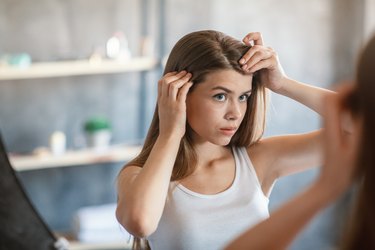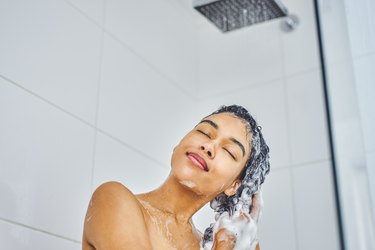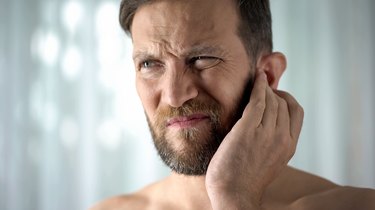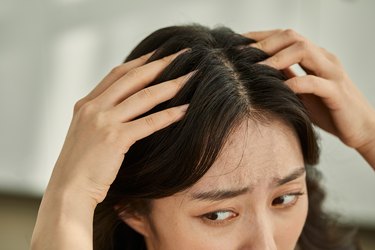
It's a mystery: You've just washed your hair, and yet your scalp still smells sour or rotten, like sulfur or stinky cheese.
A healthy scalp shouldn't really have an odor, so what's going on?
Video of the Day
Video of the Day
What Causes a Smelly Scalp
There are a lot of possible reasons behind "smelly hair syndrome," including:
1. Not Washing Your Hair Enough
"If you don't wash regularly, you may experience a buildup of oil, sebum and sweat that can leave an odor," Julie K. Karen, MD, a dermatologist at Complete Skin MD, tells LIVESTRONG.com.
This is especially true if you use a lot of hair product, exercise a lot, are prone to excessive sweating or are going through hormonal changes (think: puberty, menopause) that affect your sweat production.
2. Over-Washing
Another common mistake is washing your hair too often. Mehmet Göker, MD, a dermatology specialist at Vera Clinic, says over-washing your hair can "damage your scalp's microbiome," which "provides easier access to bad bacteria and fungi, which can cause inflammation and itching."
Tip
It's best to wash your hair between one and four times per week, but the exact number depends on your hair type, the products you use, how often you exercise and your age.
3. Your Diet
Kemunto Mokaya, MD, a board-certified dermatologist in Houston, says your diet might be the culprit, especially "if you eat excessively pungent foods like garlic and onion, or if you have a heavy animal-based diet."
4. Air Pollution
A smelly scalp may also be caused by environmental factors like air pollution. If you live in an area where the air is highly polluted, smelly particles may cling to your hair and scalp.
5. Seborrheic Dermatitis
Seborrheic dermatitis is a common skin condition marked by itchy, red patches or powdery flakes on your scalp (dandruff), according to the Mayo Clinic, and it can cause your scalp to smell.
6. Scalp Psoriasis
Scalp psoriasis can cause reddish patches, silvery-white scales and dandruff-like flaking on your head, according to the American Academy of Dermatology. Your scalp may also burn or itch, and you might have temporary hair loss. If it's not taken care of properly, psoriasis can cause your scalp to smell.
7. Infection
Skin infections — usually fungal infections on the scalp — can lead to unpleasant odors.
One possibility is tinea capitis, or ringworm of the scalp, according to Mount Sinai. Ringworm is usually itchy and marked by round areas of scaly skin that are red and swollen; pus-filled sores; and bald patches. It's more likely to occur if you don't wash your hair often and have wet skin for a long time (such as from sweating).
Another culprit is a scalp yeast infection, which can cause an itchy rash on the skin, according to the U.S. National Library of Medicine.
At-Home Remedies for a Smelly Scalp
To get rid of that bad smell in your hair, try these doctor-approved remedies:
1. Dandruff-Fighting Shampoo
If your smelly scalp is caused by seborrheic dermatitis, Dr. Mokaya recommends treating it with topical, OTC dandruff shampoos that contain ingredients like zinc pyrithione, ketoconazole, salicylic acid, selenium sulfide or coal tar.
Dr. Karen recommends Jupiter's Balancing Shampoo ($24, HelloJupiter.com), because it is a "wonderful cleanser that also gets at the root of flaking — leaving your hair and scalp refreshed and smelling great."
She also recommends Jupiter's Restoring Serum ($26, HelloJupiter.com) for anyone who washes their hair less frequently, as it's a leave-in product that "helps to control oil production between washes, which leaves your scalp clear and can stave off odors."
A smelly scalp can also be treated with some items you probably already have at home. The dermatologists interviewed recommend the following:
2. Baking Soda
Simply rub it into your scalp in the shower and rinse after a few minutes.
3. Coconut Oil
Rub three to five teaspoons of coconut oil into your scalp and leave for one hour before rinsing.
4. Aloe Vera
Apply a small amount to your scalp and rinse after 15 to 20 minutes.
5. Apple Cider Vinegar
Mix a half cup of apple cider vinegar with two cups of water, wash your hair with it, then rinse.
6. Lemon Juice
Mix two teaspoons of lemon juice with one cup of water, wash your hair with it, then rinse. Dr. Mokaya says to "be careful with lemon juice," as it "can irritate the skin and make it more sensitive to sunlight."
While these remedies can often be effective, Dr. Karen typically cautions against DIY home treatments, as it's difficult to get the mixture and dosage right.
"I've seen one too many DIY scalp treatments go awry, leaving the scalp irritated and often smelling worse than when it started," she says.
Related Reading
How to Prevent a Smelly Scalp
1. Keep Hands Off
"To prevent a smelly scalp, I recommend not scratching or touching your scalp, as it will only trigger more oil production," Dr. Göker says.
2. Use Anti-Dandruff Shampoo Regularly
Dr. Göker also recommends using an anti-dandruff shampoo to prevent irritation if your scalp is sensitive, and washing your hair every two to three days.
Dr. Mokaya says it's important to wash your scalp with products that are suited to your texture and skin type, and that the frequency of washing depends on ethnicity.
"In general, white and Asian people can wash their hair daily or every other day," she says. "People of African descent should shampoo once a week (unless their hair is short and can handle more frequent washing without drying out too much)."
3. Avoid Certain Products
Dr. Mokaya recommends avoiding products with irritating ingredients like parfum, sodium lauryl sulfate (SLS) and para-phenylenediamine (PPD).
4. Use a Scalp Brush
Dr. Karen believes the "best way to prevent a smelly scalp is finding a regular scalp care routine and sticking to it." She suggests using a scalp massager or brush a couple times a week to exfoliate prior to cleansing as "this helps break up and clear away dead skin cells and buildup that, when left on the scalp."
Try These Scalp Brushes
- Zyllion Shampoo Brush and Scalp Massager ($5.95, Amazon)
- Maxsoft Scalp Care Brush ($6.98, Amazon.com)
5. Wash Your Hair After Workouts
"The buildup of sweat can be a breeding ground for bacteria, which is a factor in your scalp and hair smelling bad," Dr. Karen says.
6. Pay Attention to Your Diet
"Just like certain foods can cause us to break out on our skin, our scalps often react similarly. An irritated, oily scalp can mean a smelly scalp too," Dr. Karen says.
Try keeping a food diary to determine if your scalp smell gets worse when you eat certain foods.
Medical Treatments for a Smelly Scalp
The treatments available will depend on the cause of the smelly scalp.
"If it is seborrheic dermatitis, a prescription antifungal medication may be prescribed in addition to topical steroids and/or other anti-inflammatory agents," Dr. Mokaya says.
Conditions like psoriasis can be treated with topical corticosteroids or anti-inflammatories like tacrolimus, vitamin D-based topicals such as calcipotriene or topical retinoids like tazarotene, she says. In severe cases, systemic medications like biologics and oral prescription meds may be needed. Sometimes, phototherapy may be recommended, too.
Fungal infections like ringworm or yeast infection may be treated with oral antifungal and/or antibiotic treatments, Dr. Mokaya says.
When to See a Doctor
"If you notice that you are following at-home remedies and the products used aren't effective, I recommend seeking medical advice," Dr. Göker says. "Depending on the cause, they may be able to recommend a medical treatment or other products to use."
Is this an emergency? If you are experiencing serious medical symptoms, please see the National Library of Medicine’s list of signs you need emergency medical attention or call 911.


